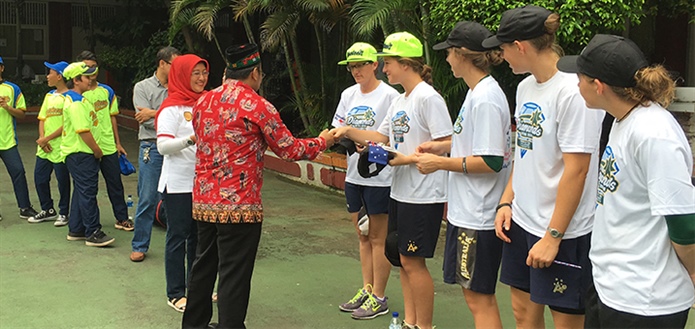When you polish a diamond, it shines.
Diamonds in the Rough debuted in May as an historic multi-partner sports diplomacy program in Indonesia. Led by 15 members of the Emeralds, the Australian women’s national baseball team, the program brought together baseball players, coaches, and community members to teach and learn crucial life skills both on and off the diamond. Over the course of the seven day initiative, more than 50 Indonesian girls, called Diamonds, participated in the programs and sessions coordinated by the Emeralds.
The program’s principal funding came through an Asian Sports Partnerships small grant, which is part of the Department of Foreign Affairs and Trade’s new sports diplomacy strategy. The grant relates closely to the second goal of the strategy, enhancing sport for development, and aimed to empower and teach Indonesian girls confidence, self-reliance, and teamwork through participation in a series of on-field baseball clinics and off-field activities. The Emeralds who led the programs set a lasting example of leadership and character.
“It was such a positive event for the girls,” said Arie, the mother of several of the participants. “Very beneficial from many different perspectives. Not only my girls learnt about baseball but many other things as well.”
Diamonds in the Rough is project managed by Aussie Hearts International Women’s Baseball, and is also supported in Australia by the NOMORE campaign to raise awareness of domestic violence and Baseball Australia. Locally, baseball school, The Hit Factory is the program’s major in-country partner, providing facilities and coaching for the clinics, and the Conference of Australian and Indonesian Youth (CAUSINDY) connected the program with a local women’s organization Soroptomist International and TelkomTelstra, the biggest bilateral partnership between Australia and Indonesia, who both helped to deliver part of the program.
“The Diamonds in the Rough program was not like anything I had ever experienced, it was so much more than another baseball trip,” said Victorian Bronwyn Gell. “The experience taught me so much about the world, about baseball, about the Indonesian culture and most surprisingly I learnt so much about myself.”
“It was the first time we have done something that was about building an understanding / relationship between two countries, talking about family violence, and growing the bond between our own team members,” added Victorian Shae Lillywhite.
As a way of further empowering women and challenging traditional gender norms, the Emeralds played several games against local men’s teams. Indonesia ranks 110th out of 188 nations in the world on the United Nations 2015 Human Development Report’s Gender Inequality Index, a metric that expresses the inequality in achievement between men and women in a given nation. This inequality is also visible in Indonesian women’s access to baseball; while younger girls can play once they reach 14 they are required to switch to softball, erroneously perceived as the female equivalent to baseball. As a result of these perceptions, the games against the men’s teams were critical moments for the Emeralds, program participants, and community members to transcend gender boundaries and find common ground on a diamond. One of the games even saw a male Indonesian ballplayer give his game jersey to the Emeralds after the game, in a traditional international sport gesture of respect.
One off-field aspect of the program centered on a lunch and panel discussion that featured several Emeralds players and two female executives from Telkomtelstra sharing their experiences of how they overcame challenges both personally and professionally. The Diamonds also participated in goal discovery sessions, in which they were encouraged to think about their future potential without the obstacles created by gender barriers.
Based on post-event data, the program had an immediate impact on the self-confidence of the Diamonds. Prior to the start of the program, 36 percent of the Diamonds agreed that they will be able to reach their goals. After the program, that number jumped to 47 percent. Similarly, nine percent of Diamonds thought they are as smart as others before the program; afterwards, 20 percent believed this same fact to be true. This sense of confidence also translated to Diamonds’ perceptions of themselves in the classroom. After the program, 33 percent strongly agreed that they can understand the ideas and skills taught at school, compared with just 18 percent before the program.
“[I’m] happy for the opportunity given for the girls,” said Anisa, the mother of Nasya, one of the Diamonds. “Not only they had the chance to learn new and effective approaches in baseball basic skills, they also got to learn about self-consciousness as girls, as part of the community and knowing that they have the right and pride to choose and to defend themselves in the most positive ways.”
As much as it mattered to the Diamonds, the experience was just as unforgettable for the Emeralds.
“Hearing inspiring stories from women who have pursued and have succeeded against their own challenges and inspiring young girls to follow their dreams was not only thoroughly enjoyable, but a rewarding and a challenging experience that I would love to be a part of in the future,” Lillywhite said.
“I have come home feeling so inspired, and I find myself seeking opportunities where I can do more,” Gell said. “The Indonesian girls inspired me and I still keep in touch with some of them who tell me every day that they miss us.”
Gell, Lillywhite and the Emeralds won’t have to wait long to see their new Indonesian friends again. After the first successful run of Diamonds in the Rough, programming continues for the Diamonds in July, and the Emeralds will return in the first week of November to undertake a similarly structured program.

